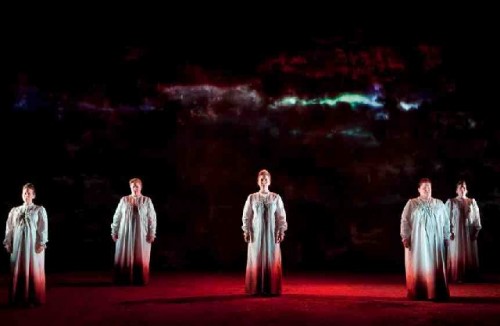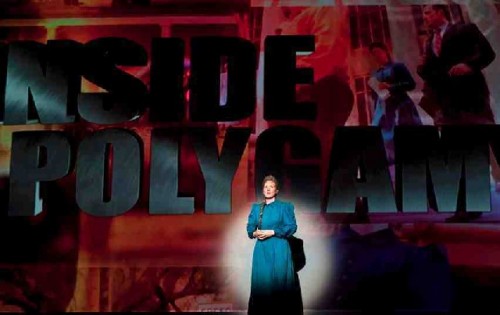Nico Muhly's Dark Sisters in World Premiere
A Moving Performance by the Gotham Opera
By: Susan Hall - Nov 10, 2011
Dark Sisters
Gotham Chamber Opera
World Premier Gerald Lynch Theater
November 9, 2011
Music by Nico Muhly
Libretto by Stephen Karam
Neal Goren, Conductor
Rebecca Taichman, Director
Co-Commissioned and Co-produced by Gotham Chamber Opera, Music-Theatre Group and Opera Company of Philadelphia
Eliza — Caitlin Lynch
Ruth — Eve Gigliotti
Almera — Jennifer Check
Presendia — Margaret Lattimore
Zina — Jennifer Zetlan
Prophet — Kevin Burdette
Lucinda — Kristina Bachrach
Photo credits Richard Termine courtesy Gotham Opera
The world premier of Nico Muhly’s eagerly anticipated chamber opera, Dark Sisters, was held at the Gerald Lynch Theater in New York last night. Signaling its importance to the opera community, the general manager of the Metropolitan Opera, every member of the press you could name, familiar singers and directors were all on hand. This performance was promising.
Muhly is most familiar for his film score for The Reader, an emotionally powerful and beautiful evocation of a complicated subject. Muhly is daring in his selection of subjects and Dark Sisters is no exception. Focused on trials of a polygamous Mormon family, the story teases out the complications of several women sharing a man.
Wisely Muhly and his librettist Stephen Karam portray these women using their children as a lifeline. All women do this. When the going gets tough, we summon up maternal love and dwell in it, a sanctuary for an otherwise troubled life.
As the opera begins, the family compound has been raided and the children removed. Through the various options open to them, the characters of the five mothers in this family group are contrasted.
Singing Ruth, Eve Gigliotti is anguished as she mourns the accidental loss of two children. Turning in to cope, Ruth ends up torturing herself. Jennifer Check, of large and beautiful voice, evokes the long history of women giving themselves up before they come of age to men assigned to them. She recalls her mother and grandmother, and wishes to stay in their tradition by complying with ‘the prophet’ and following his party line.
Margaret Lattimore and Jennifer Zetlan expose the dangers of jealousy, waiting for ‘the prophet’ to choose which one he will spend the night with, they brag about and compare the value of a sewing machine and a flower he has given each of them.
The young bass Kevin Burdette, whose comic touch has made him an audience favorite, displayed instead a zealot prophet who doubles as a newscaster who can’t deal with the news. He has a compelling stage presence, and a varied vocal performance centered in a resonant tone.
Muhly’s music is curiously spare here, perhaps because it is composed for a chamber orchestra, ably led by Neal Goren. What is always evident in Muhly compositions is the lyric line. He is unembarrassed to show his debt to more traditional forms, including here Abide with Me, sung at the funeral of one wife. Composed by William Henry Monk, Henry Francis Lyte wrote the words as he lay dying in 1847. We still sing Arthur Sullivan’s Onward Christian Soldiers.
The melodies of the opera are clearly written, but are not so clearly on display in performance. As singers settle into the piece, these lyric lines will surely come front and center. Sometimes Muhly seems top heavy, with his lovely use of chimes and bell-like sounds. Yet this opera is definitely grounded in lower registers and sometimes story-appropriate harshness and harmonic clashes.
The opera is not only moving, but raises questions swirling about us now. The most obvious is that we have two Mormons running for President, Romney the more conventional. He is not a polygamist, but did send all his children out as missionaries. Huntsman is married to an Episcopalian and has a more mixed Mormon message.
Through a wider lens, questions about society’s role in dictating bedroom behavior are raised. References to gay marriage pleased the audience. A pimp’s family is also a group of women all dependent on one man. Smart pimps keep each of their women under a separate roof and apart as much as possible. Running off and coming back, an option not available to Mormon wives, keeps the top man on his toes and forces him to pay attention to his women’s needs. These ‘wives’ are only required to help each other earn money, which they turn over to their common man. Pimps might take a page from the Dark Sisters book where young children become the tie that binds women to their commonly shared man.
Caitlin Lynch in the lead role of Eliza is magnificent. Hers is the questioning role. She was forced by her own family to marry ‘the prophet,’ and hears her own underage daughter’s plea to be released from her assignment to marry a very old man (he is 56).
As the daughter Lucinda, Kristina Bachrach is achingly conflicted. In her bright voice, she indicates her disgust at her assigned marriage, but in the end is unwilling to give up home and its familiar ways. Eliza is braver.
The simple sets are evocative and demonstrate how well chosen details magnified for effect can serve opera perfectly. In Act I, a big sky changes endlessly through the night. Red clay earth is suggested on the easily negotiable rake of the stage floor. Long white dresses are worn in the compliant, 'Keep Sweet,’ part of the story. Colored dresses suggest the possibility of emancipation, and trick a TV audience into thinking these wives are free to decide the arc of their lives.
Directorial choices by Rebecca Taichman combined repeated gestures and movements, which created a formal and never-ending pageant and the emotionally wrenching explorations of these women’s buried feelings.
A moving evening of arresting music, performed with grace and attention to emotional detail, in a provocative story.
Performances in New York continue until November 19. The opera will be reprised in Philadelphia from June 8-13.




